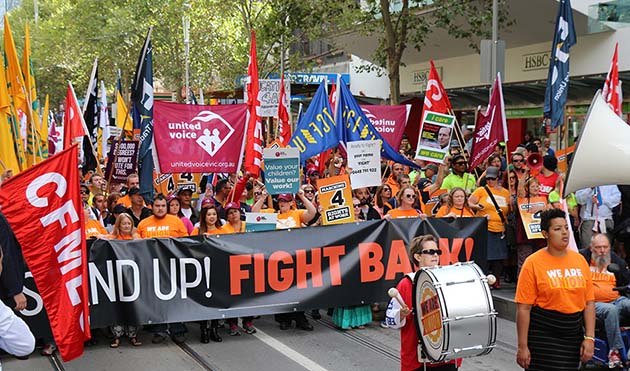Malcolm Turnbull has pulled the trigger to call an early election, re-calling parliament on 18 April and scheduling the budget for 3 May.
He is demanding that the Senate pass both the Australian Building and Construction Commission (ABCC) and the Registered Organisations bill, or he will hold a double dissolution election in July.
The ABCC, introduced by John Howard’s government and stripped of some of its powers under Julia Gillard, is aimed at breaking the construction unions, in particular the CFMEU.
It would introduce extraordinary powers that make construction workers second-class citizens. They can be forced to answer questions in secret, with no right to choose their own lawyer or to reveal to anyone afterwards what they were questioned about, under the threat of six months’ jail for refusing.
As Professor George Williams of the University of NSW has explained, “A person can be compelled to hand over personal phone and email records, reveal memberships of a union or political party, and report on private meetings.”
Turnbull’s revived ABCC would be even more powerful than in the past—extending its scope further along the construction supply chain, making community picket lines illegal and introducing greater fines of $34,000 for an individual and $170,000 for a union.
Malcolm Turnbull talks of “lawlessness” in the construction industry. But the purpose of the ABCC is to dig up charges against the CFMEU for breaches of industrial law—defying restrictions on the right to strike that are some of the toughest in the industrialised world.
The ABCC is designed to stop unions looking after safety and working conditions in the building industry. This will result in more deaths on sites.
Construction is a dangerous industry. After the ABCC was introduced in 2005 both the rate and the number of deaths in construction rose significantly, peaking at 45 in 2007. They declined rapidly after it went in 2012.
Greens’ mistake
Unfortunately The Greens have helped load the gun that Turnbull is holding to the heads of the cross-benchers by passing his Senate reform legislation last week. As a result cross-benchers who voted against the ABCC last time face the choice of supporting the ABCC or possibly ending their political careers.
It was seriously mistaken for The Greens to pass laws that make the option of a double dissolution election attractive to Turnbull. It is not enough that The Greens vigorously oppose the ABCC. Their vote for Senate reforms has given Turnbull a much greater chance of passing the legislation, either through the Senate cross-benchers caving into pressure and passing the bill, or at a joint sitting of both houses of Parliament, which can deal with blocked bills after a double dissolution election.
The only guarantee that Turnbull’s anti-union laws can be stopped now is an industrial campaign. Turnbull is vulnerable—as his recent slide in the polls shows. The Liberals’ agenda, begun in Tony Abbott’s failed 2014 budget, is widely unpopular. A re-elected Turnbull government would move hard to attack Medicare, penalty rates, and cut spending on health and education.
The ACTU’s strategy for stopping the ABCC has focused exclusively on lobbying the cross-benchers, and more recently on an electoral strategy of maximising Labor’s vote by vilifying The Greens over Senate reform.
But to stop Turnbull we need a revived Your Rights at Work campaign with mass union demonstrations and strikes. There needs to be a nation-wide strike on 18 April. This will focus attention on what Turnbull stands for and the consequences of re-electing a Liberal government.
And it would lay the ground for the defiance of the ABCC that will be necessary if it comes into law—including through industrial action if the ABCC tries to step onto building sites.
This kind of action will be stronger if the left is united in common struggle against the Liberals. The Greens’ actions last week have damaged their credibility with the union movement. To make up any ground, they will need to make it very clear that opposition to the ABCC and support for the union movement is their primary concern.
Richard Di Natale’s moves towards pragmatism and willingness to strike deals with the Liberals must end. The Greens need to rule out any electoral co-operation with the Liberals and ensure that all their preferences at the election go to Labor.
If The Greens joined the unions in fighting Turnbull on the streets they could begin to repair the damage.
Back the public servants
The campaign by public servants for a decent wage rise also takes on a greater importance given Turnbull’s move for a union-bashing election. Public servants have been denied a wage rise for almost three years, and the government is out to attack jobs and conditions.
Staff at Medicare, Centrelink, the Tax Office, Defence, the Bureau of Meteorology, the Department of Prime Minister and Cabinet, Immigration and Border Protection and the Bureau of Statistics have taken industrial action. Every union needs to get behind their fight.
To stop Turnbull, the ACTU should be calling strikes and mass demonstrations against the ABCC. Turnbull talks about “innovation” but he is another Tony Abbott—ruling for the rich and the business elite.






